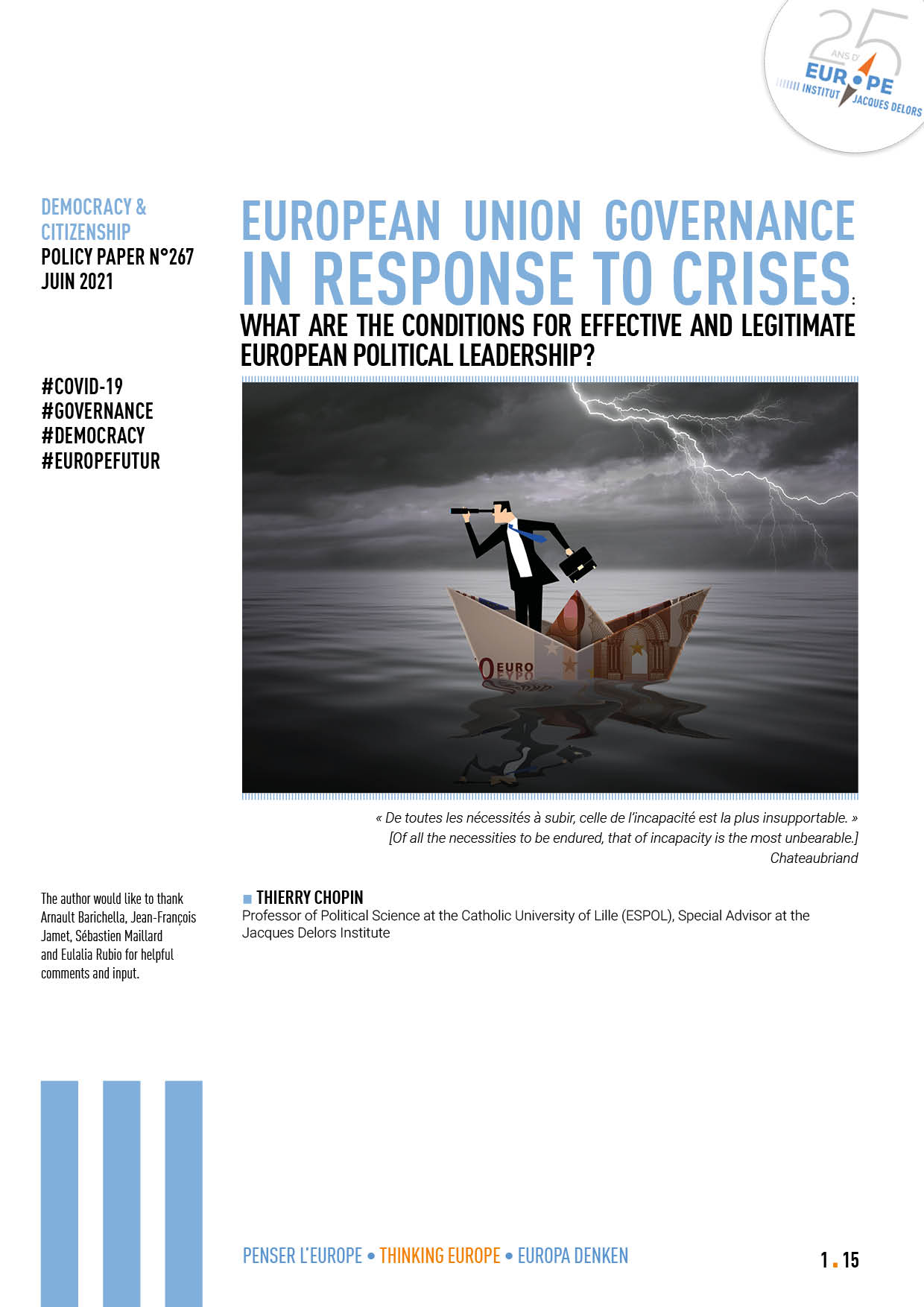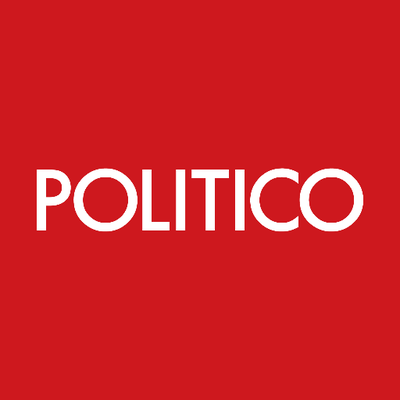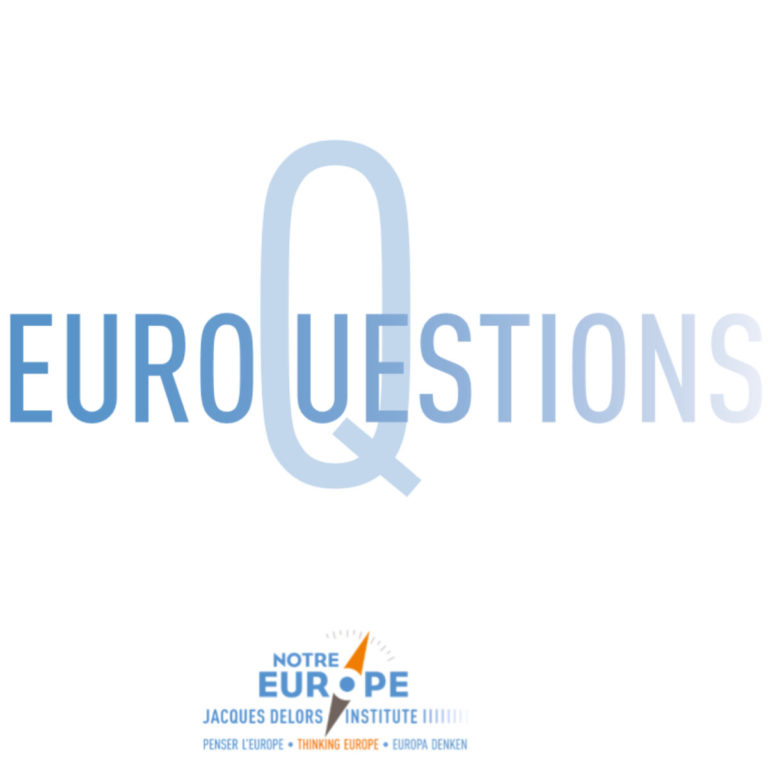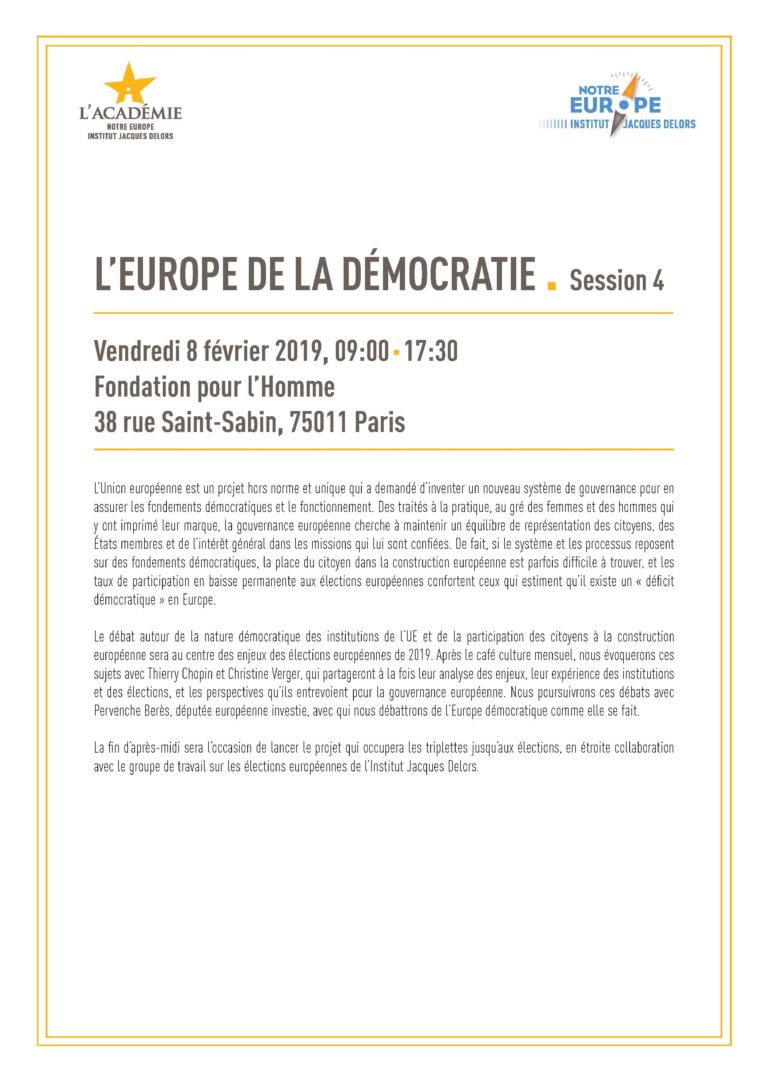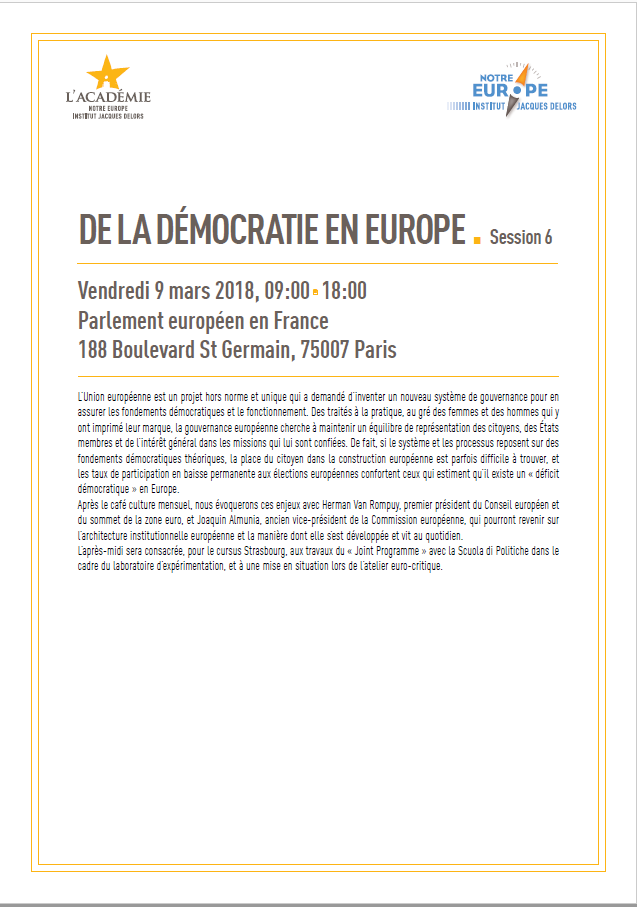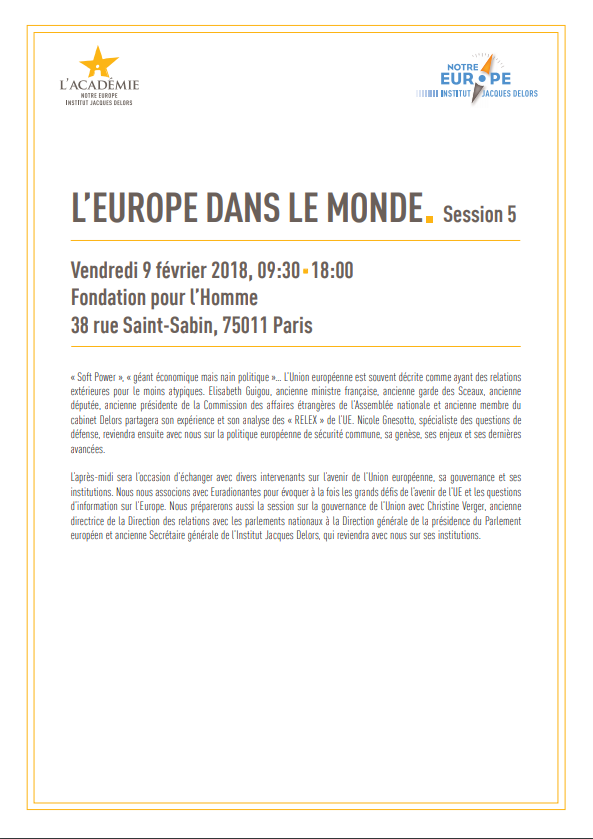Policy paper 267
European Union governance in response to crises
What are the conditions for effective and legitimate European political leadership?
Abstract ▪
1 ▪ Lessons learned from a decade of “sovereignty crises”
After more than ten years of crises, the EU’s current operating structure gives primacy to the European Council. This predominance of national governments and of the diplomatic approach has ambivalent repercussions. It raises a twofold issue of efficacy (leading to complex and slow negotiations, causing uncertainty and preventing the EU from speaking with one voice) and of legitimacy (as the political legitimacy of members within the European Council is conferred on a national level, and not on a European scale).
2 ▪ The EU faces the challenge of embodying its capacity for action and decision-making
Admittedly, progress has been made during the COVID-19 crisis regarding the EU’s ability to make key decisions, in particular with the decision to issue a common debt to finance the response to the pandemic and economic recovery. However, the health crisis has underscored structural weaknesses in the EU’s crisis management capacity –in terms of forward-thinking, preparation and decision-making– but also in the actual implementation of the solidarity principle, which must be strengthened and put into greater effect ahead of future crises. European political leadership must absolutely be clarified in terms of the rivalry between institutions and Member States.
3 ▪ What can be done? Under which conditions can a European decision-making capacity and political leadership be achieved?
Resolving the EU’s “executive deficit” must entail the fostering of clearer, more legitimate and more responsible political leadership. In the short term, this would involve in particular putting a face on the response to the health crisis –for example by drawing inspiration from the “Barnier method” which highlighted a highly effective coordination between political objectives, technical implementation, the implications for the EU institutions, along with a clear leadership. In the medium to long term, three avenues emerge as key if a more legitimate, more responsible and therefore more efficient political leadership is to be developed: strengthen the “Spitzenkandidaten” system to elect the President of the Commission, reform the electoral system at the European Parliament by creating transnational lists that are likely to contribute towards bolstering the legitimacy of the choice made by EU leaders and subsequently their effectiveness. Lastly, the legitimacy and efficacy of the EU could be usefully reinforced by implementing a contract of mandate between the European Parliament, the Commission and the Council.
SUR LE MÊME THÈME
ON THE SAME THEME
PUBLICATIONS
The legal case against Hungary’s anti-LGBTIQ+ law

EU economic governance in the new geopolitical scenario: a policy agenda

Praise for representative democracy

MÉDIAS
MEDIAS
La bataille des subventions menace l’unité de l’Europe

Face à la Russie, une Europe à 47 !

Politico Playbook Brussels: THE POWER OF THE PARTIES

ÉVÉNEMENTS
EVENTS
EUROPEAN DEMOCRACY IN A TIME OF CONFUSION

Le Grand Continent | L’Union européenne doit-elle s’élargir ? [FR]

Euroquestions #66 | Between the Slovakian and Polish elections, where is Central Europe heading? [FR]

Les Rencontres du Grand Continent au Sénat | European democracy in the face of crises: what role for parliaments? [FR]

Inaugural session of Academie Notre Europe : Political and institutional Europe

Balkans, Eastern Europe… Which European Political Community? [FR]

Jacques Delors Conference: The Promise of Europe [FR]

Euroquestions | Balkans, Ukraine, European Political Community, Conference on the Future of Europe. What to expect from the next European Council? [FR]

Building Europe differently [FR]

Mardi du Grand Continent : How to interpret the results of the first round? [FR]

Europe is great, building it is better ! [FR]

TOWARDS A EUROPEAN HEALTH UNION – Prevention, crisis management, multilateralism | Presentation of the report published in December 2021 [FR]

Conference TEDx Lannion | Europe with 3-Ds [FR]

Euroquestion | Quelle gestion de l’endettement public à la suite du Covid ?

Euroquestions | Représentation et participation : réinventer la démocratie en Europe

Visioconférence : Pandémie – L’Europe de la relance

Euroquestions | Can European funds guarantee the rule of law ?

Le monde en crises : impacts de la COVID-19 sur le commerce international

L’enseignement scolaire de l’Histoire

Euroquestions | Relance et puissance : mots d’ordre de la rentrée européenne

Wébinaire | Préparer un avenir propre et résilient pour les villes européennes

Negotiating the Future EU-UK Relationship in times of Pandemics

WEBINAR | A European Border Carbon Adjustment proposal

WEBINAR | The day after the European Commission’s Post-Covid economic recovery proposal

Wébinaire | Présentation du rapport “Les français et l’Europe entre défiance et ambivalence”

Webinar | Greener After – A Green Recovery Stimulus for a post-COVID-19 Europe

Green Recovery Post Covid-19: European or National Strategies?

Quel rôle pour l’Europe dans un monde post-Covid ?

WEBINAR | Overcoming Covid-19 crises by building a clean and resilient Europe

LIVE STREAM | Digital sovereignty in the age of pandemics

Académie n°7 – L’Europe économique

Webinar | SURE : a welcomed catalyzer for an European Unemployment Insurance*

Webinar | The day after the Eurogroup Meeting : outcomes & opportunities

WEBINAR | THE EUROPEAN GREEN DEAL AN ECONOMIC STIMULUS DURING A TIME OF CRISIS

Conférence
CEPS Ideas Lab

Aix-en-Provence, 27th of September 2019 – European elections 2019: what impact on the European Union?

Budapest, 10 to 14 July – Budapest European Agora

Paris, 21 June 2019 – Session 8: Europe of the Futur

Deauville, 27 April 2019 — Deauville Days : The future of Europe

Nice, 24 April 2019 — A new horizon for Europe : Renaissance public meeting

Paris, 19 February 2019 – Democracy in Europe: Interference and misinformation at the dawn of the European elections

Paris, 8 February 2019 – Session n°4 of the Académie Notre Europe : Europe of democracy

Paris, 13 novembre 2018 – Quel rôle pour l’économie sociale dans le futur de l’Europe ?

Tallinn, 27 and 28 September 2018 – Nordic Baltic Energy Conference

Madrid, 25 September 2018 – The EU economic governance

Paris, 7 September 2018 – Model European Union Paris

Paris, 11 July 2018 – Citizen consultation : what is Europe purpose?

Brussels, 28 June 2018 – Globalisation and Europeanisation: European solutions for global problems?

Paris, 20 June 2018 – Future Europe

Prague, 19 June 2018 – Europe of Citizens? Public Perceptions of the EU and its Reform

Montreal, 11 June 2018 – Europe at the Crossroads

Paris, 6 June 2018 – Fact-finding mission on Europe “Achieve the democratic refounding process”

Geneva, 1st June 2018 – The European Union future: challenges and prospects

Strasbourg, 1st June 2018 – Europe on trial: Who’s to blame for the break-up?

Paris, 18 May 2018 – One Vision: Awaken the European spirit

Paris, 16 May 2018 – Global Markets

Freiburg, 26 April 2018 – 11th Franco-German cultural meetings

Brussels, 20 April 2018 – White Paper on the Future of Europe

Paris, 9 March 2018 – Académie: Democracy in Europe

Brussels, 23 February 2018 – CEPS Idea Lab

London, 16 February 2018 – Reconnecting the EU with its Citizens










